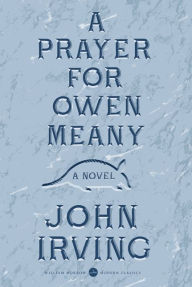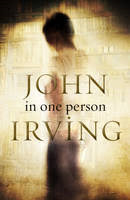
I cannot praise A Prayer for Owen Meany by John Irving highly enough. I usually finish one book and open another right away, but I still feel so attached to these characters that I am not ready to let go of this story yet. I’ll either have to bury myself in cookbooks for a week or so until I get the urge for something else, or start back at the first page of this book and go again. I don’t even want to read another John Irving book, I just want more of A Prayer for Owen Meany.
The story is narrated in the first person by John Wheelwright. The story is told in two sets of times, starting with John as a child and alternating with the present-day John who lives and works in Canada as an English teacher. The very first sentence of the story tells us that Owen Meany is no longer alive, had a “wrecked voice” and was physically the smallest person John ever knew, that he had been responsible in some way for the death of John’s mother and was also responsible for John’s Christianity. That is a big first sentence, not in the sense of being overlong, but it certainly tells us what the story is about.
John and Owen, who lived in Gravesend, a town in New Hampshire, were friends since childhood. Owen was so small that John and his fellow Sunday School classmates used to physically pass Owen around over their heads when their teacher was out of the room, against Owen’s wishes.
Owen’s words are always in capital letters, At first I found this irritating, but I quickly became accustomed to their use as the capitals emphasized that Owen’s voice was a strangled falsetto, even after he became an adult. Once, after John frightened Owen, his grandmother told him,
“I don’t want you to describe to me-not ever-what you were doing to that poor boy to make him sound like that; but if you ever do it again, please cover his mouth with your hand.”
Yes, this sentence made me laugh – on the train… Honestly, until you have laughed out loud to yourself while you are on your own in a public place, you can have no idea of how socially awkward this can be!
Despite being the size of a five-year old, Owen was mentally the leader of his peers and was also the object of the affections of most of the girls he ever met. Owen’s teachers and the adults in his life generally loved him too and went out of their way to assist with his education and in other ways. Adults and children alike, apart from a few exceptions which became part of the story, fell in with Owen’s plans and arrangements, particularly as he and John became older and Owen became the voice of his graduating year.
When John and Owen were 11 they were playing team baseball when Owen went out to bat and hit a foul ball which hit and killed John’s mother, Tabitha. John, Owen and John’s step-father, Dan, grieved together. John never attributed any blame to Owen, who himself believed that there was a reason for everything and that in this case, God had used him as the instrument of Tabitha’s death.
Owen’s belief in God, or faith is extraordinary. His parents left, or in Owen’s words, “escaped” the Catholic church for reasons which become clear later in the book, and as a child, Owen certainly has it in for the Catholics. Gravesend has plenty of other religious choices though, for example, John begins life as a Congregationalist and later, along with his mother, becomes a Episcopalian when she marries Dan.
Owen is an Episcopalian who sees angels and his own future, and knows from a very young age that he is destined to save a group of Vietnamese children at the expense of his own life. John sees himself as a ‘Joseph,’ the fellow in the background who is just there, no more and no less.
As a child, Owen made an interesting point when he complains that the girl chosen to be Mary in their Sunday School Christmas play is always the prettiest girl. “WHO SAYS MARY WAS PRETTY?” He also complains about the Pastor’s lack of belief, “IF HE’S GOT SO MUCH DOUBT, HE’S IN THE WRONG BUSINESS.” The book is full of Owen’s observations and suggestions.
About three quarters of the way through the story I realised that each character’s name has at least one hidden meaning. Owen’s first name, which he doesn’t use, is Paul and means ‘little.’ Very apt. Saint Paul began by persecuting Christ’s early followers, but turned his life around to live for Christ and to advance Christianity, which also reflected Owen’s path in life. John’s name is also biblical, and in this book his character is probably closest to the apostle John, who gave us the fourth Gospel and Revelations. Again, a fitting name for this character. John’s mother, Tabitha is ‘good works’ and Hester, John’s cousin and Owen’s lover is a ‘scarlet woman’ and both of these names also suit the characters. I expect if I delved into other names in the book, I would find more meanings which tell us who each character is at their heart.
Owen, who knows he is destined for Vietnam, takes a scholarship from the Army during the 1960s while the war in Vietnam was raging. Once he graduates, his work is bringing dead soldiers home to their families.
Owen is instrumental in preventing John from going to Vietnam and when I read how, I was on the train going to work. I read a few words and couldn’t bear it any more so looked out of the window for a while at people’s backyards, read a few more words, then went back to looking out the window, trying not to shiver and shudder. It took me the whole trip in to Melbourne to get past this section.
This is such a big book that I’ve only touched on some of the themes and entirely missed other important parts of the story. Saying that any review I could write won’t do justice to the book is a cop-out but it is true.
By the end of the story John says that Owen was a ‘miracle.’ A Prayer for Owen Meany is almost enough to make me believe in miracles too. I’ll certainly be looking out for other books by John Irving once I get over this one.


Recent Comments